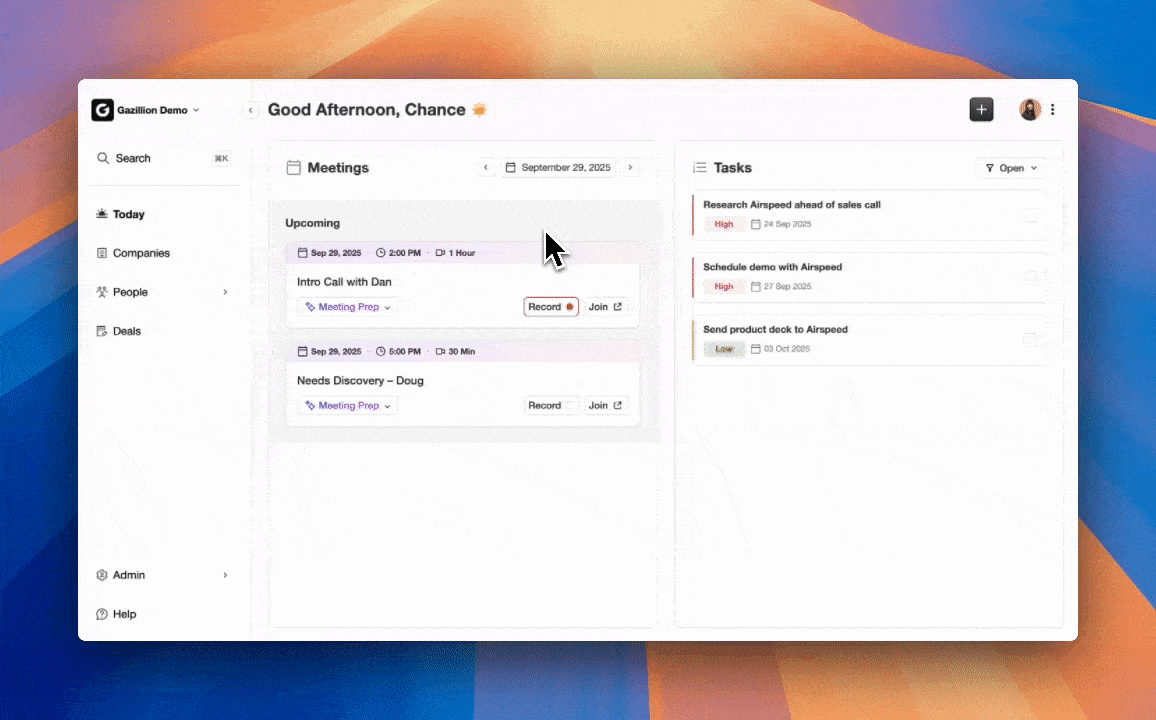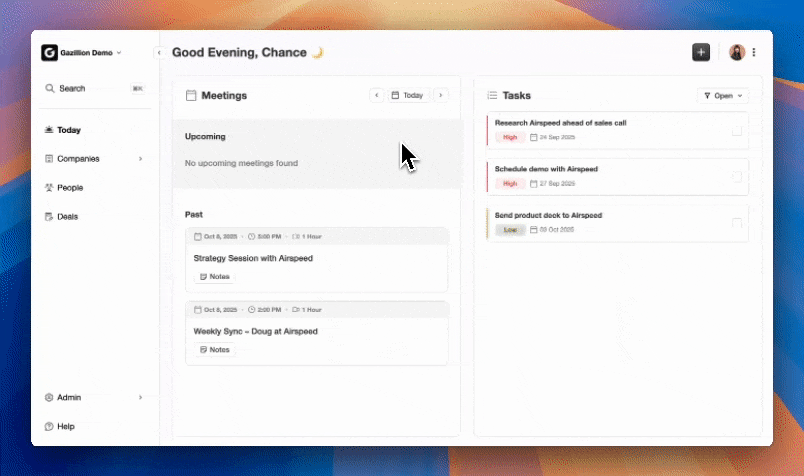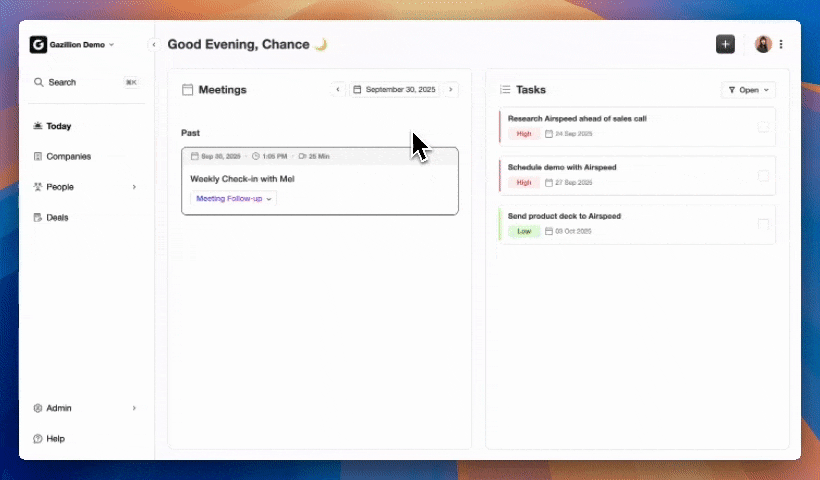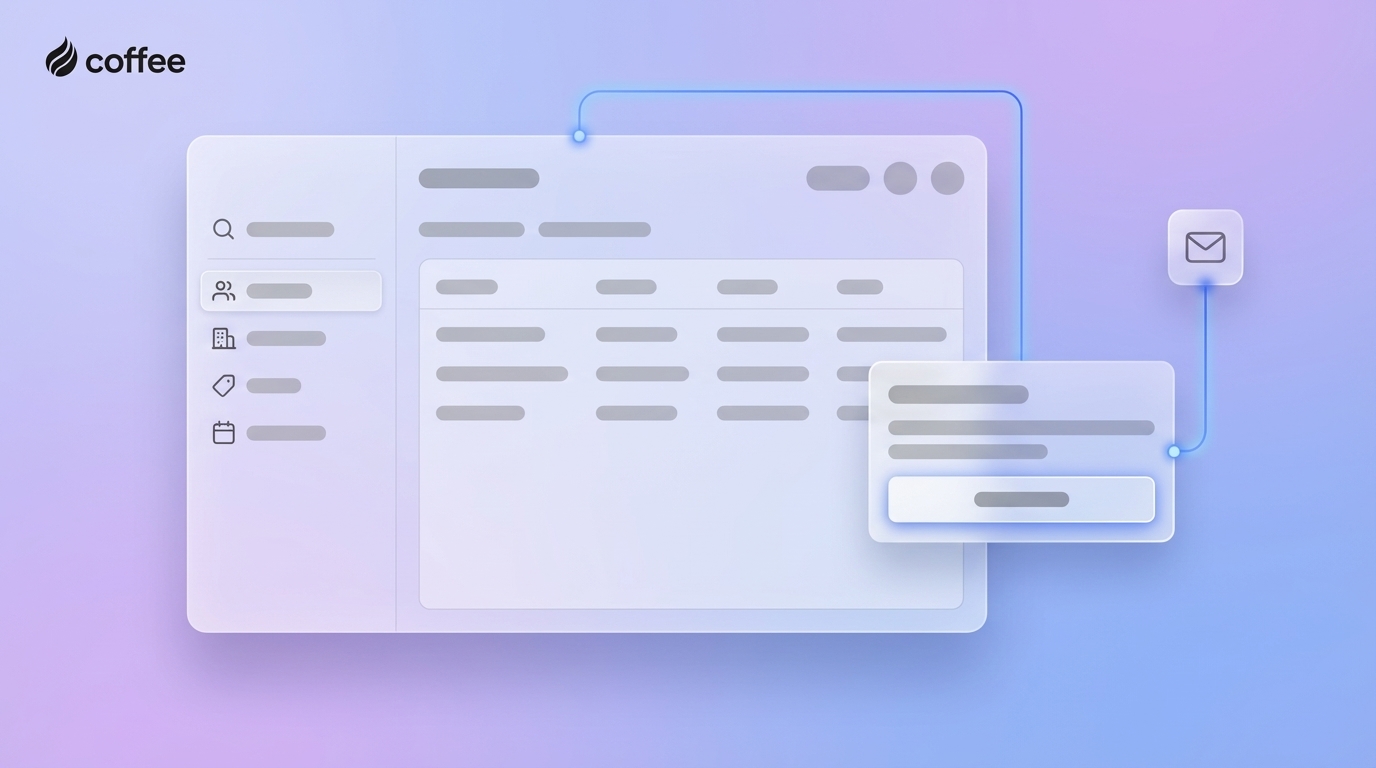Key Takeaways
- AI CRMs help sales teams reduce manual data entry, improve data quality, and recover more time for direct selling.
- Agent-led CRMs shift the workload from humans to AI, automatically capturing and organizing data from emails, calendars, and meetings.
- Enterprise platforms like Salesforce, Microsoft, and HubSpot add predictive insights and automation on top of existing ecosystems.
- Smaller teams can access affordable AI capabilities through tools like Zoho, Freshsales, and Pipedrive to streamline core sales workflows.
- Coffee provides an AI-first, agent-led CRM that automates data capture, meeting follow-up, and pipeline insights for growing teams. Explore Coffee pricing and plans.
Why AI CRM Matters For Sales Teams in 2026
Modern sales teams lose valuable time to manual CRM upkeep. Many reps spend hours each week updating contact records, logging activities, and tracking deals, which leaves less time for actual selling. Internal data from Coffee shows that 71% of sales reps feel they spend too much time on data entry and only 35% of their time on selling.
AI CRMs reduce this burden by turning the CRM into an active system that captures information, maintains data quality, and surfaces insights for the team. Instead of acting as a static database, an AI CRM becomes a practical assistant that records what happened, suggests what to do next, and keeps pipeline views accurate without constant manual input.
The Top 7 AI CRM Solutions for 2026
1. Coffee: Agent-Led CRM That Handles The Busywork
Coffee focuses on agent-led automation so sales teams do not have to maintain the CRM by hand. The Coffee AI agent captures, enriches, and structures data from emails, calls, and calendars in the background. This approach gives teams reliable “good data in, good data out” and can save individual reps 8 to 12 hours per week that would otherwise go to admin work.
Coffee supports two main deployment options. Teams can adopt Coffee as a standalone AI-first CRM, which suits small to mid-sized businesses that want a modern, lightweight system. Larger organizations can use Coffee as a companion layer on top of Salesforce or HubSpot, which lets the AI agent keep those systems updated without changing the core CRM of record.
Coffee also adds practical meeting intelligence. The AI meeting bot can join calls, record and transcribe conversations, and then draft summaries, next steps, and follow-up emails. Sales reps gain complete notes and clear action items without typing them manually.

Coffee pipeline views build on this accurate data foundation. Features like Pipeline Compare highlight week-over-week changes, such as new deals, stalled opportunities, and deals that moved stages. Leaders can run focused pipeline reviews without exporting data to spreadsheets or chasing manual updates.
2. Salesforce Einstein: Predictive Insights at Enterprise Scale
Salesforce Einstein brings machine learning and predictive analytics into the broader Salesforce platform. Teams can use Einstein for lead scoring, opportunity insights, and predictive forecasting that draw on large volumes of historical CRM data.
Enterprises benefit from automated activity capture and advanced analytics that support complex sales processes. Einstein also fits deeply into the Salesforce ecosystem, which allows custom models, dashboards, and workflows that reflect each organization’s structure and reporting needs.
3. HubSpot CRM With AI Tools: Align Inbound Marketing and Sales
HubSpot CRM integrates AI features directly into its marketing, sales, and service hubs. Businesses that rely on inbound strategies can connect website forms, content, and email campaigns to AI-driven lead scoring and nurturing.
HubSpot AI tools support content personalization, chatbots for qualification, and workflow automation across the customer journey. The interface remains accessible for growing teams, which helps organizations standardize their sales process without a heavy technical setup.
4. Zoho CRM Plus With Zia: Add AI on a Budget
Zoho CRM Plus includes Zia, an AI assistant that sits inside the platform to help with day-to-day sales work. Zia can interpret simple natural language queries, surface trends, and recommend actions based on CRM data.
Zoho focuses on affordability, which makes it a practical option for businesses that want AI features like task suggestions and anomaly detection without enterprise-level pricing. Sales teams can combine email, telephony, and support channels inside the same suite to keep customer data in one place.
5. Microsoft Dynamics 365 With Copilot: Centralize Work in Microsoft Tools
Dynamics 365 connects CRM data with Microsoft 365 applications such as Outlook and Teams. Sales reps can track activities, view records, and update deal information from tools they already use for email and collaboration.
Copilot extends Dynamics 365 with generative AI assistance. Reps can draft emails, summarize meetings, and pull account insights through natural language prompts. This experience reduces context switching for organizations already standardized on the Microsoft stack.
6. Freshsales Suite With Freddy AI: Automate Core Engagement
Freshsales Suite includes Freddy AI to help automate customer engagement. Teams can use Freddy for lead scoring, chatbot interactions, and simple predictive insights that guide follow-up priorities.
The platform suits businesses that need a combined sales and marketing tool with built-in telephony, email sequences, and basic AI support. Freddy helps route leads, suggests next steps, and keeps engagement consistent without complex configuration.
7. Pipedrive With AI Sales Assistant: Keep a Clear Visual Pipeline
Pipedrive is known for its visual pipeline management, and the AI Sales Assistant extends that approach with automated insights. The assistant highlights deals that need attention, suggests activities, and flags patterns that affect close rates.
Teams that value a simple, deal-focused interface can add light automation and guidance without overhauling their workflow. For sellers who want AI support inside a familiar pipeline board, Pipedrive remains an accessible option.
Sales teams that want deeper automation across data capture, meetings, and follow-up can move to an agent-led model with Coffee. Get started with Coffee to see how an AI agent can keep your CRM up to date for you.

Comparison Table: Key Features of Top AI CRMs in 2026
|
Feature category |
Coffee |
Salesforce Einstein |
HubSpot CRM with AI tools |
Zoho CRM Plus with Zia |
|
Core AI function |
Agent-led automation, data entry, pipeline intelligence |
Predictive analytics and lead scoring |
Marketing automation and lead scoring |
Conversational and analytical AI support |
|
Data capture |
Automatic creation from email and calendar with activity logging |
Automated activity capture across Salesforce |
Manual entry with AI assistance |
Manual entry with AI assistance |
|
Meeting intelligence |
AI meeting bot with summaries, follow-ups, and briefings |
Activity capture for enterprise accounts |
Integrated call recording and transcripts |
AI support for follow-up tasks |
|
Primary use case |
Eliminate manual work and keep CRM data accurate |
Enterprise sales performance and complex analytics |
Inbound sales and marketing alignment |
Affordable AI support for small and mid-sized businesses |
This overview represents a snapshot of capabilities that will continue to evolve as each platform expands its AI features.
Conclusion: Turn Your CRM Into a Sales Asset
AI is changing CRM from a tool that must be updated to a system that actively supports the sales process. Platforms that still rely on manual data entry create friction, incomplete records, and unreliable forecasts. AI CRMs help by capturing data at the source, standardizing workflows, and highlighting the actions that move deals forward.
Coffee focuses on this shift through an agent-led model that automates data capture, meeting workflows, and pipeline visibility. Teams can use Coffee as a standalone CRM or layer it on top of Salesforce or HubSpot to keep those systems clean without extra effort from reps.

Teams that want to reduce manual admin work and improve forecast accuracy can benefit from an AI-first approach to CRM. Review Coffee pricing to see how an agent-led CRM can fit your sales organization.
Frequently Asked Questions
How does an agent-led CRM like Coffee differ from traditional AI CRMs?
Many AI CRMs still depend on humans to enter and curate data before the AI can analyze it. An agent-led CRM like Coffee shifts that responsibility to the AI agent, which captures, enriches, and structures data from emails, calls, and calendars on its own. This approach improves data completeness and reduces the time sales reps spend on admin work.
Can AI CRMs improve data quality instead of automating bad data?
AI CRMs that capture information directly from source systems can raise data quality. Coffee, for example, pulls information from email, calendar events, and call transcripts, then enriches it with firmographic and contact details. This process reduces human error and keeps records accurate and current.
How do AI CRMs help sales teams spend more time selling?
AI CRMs automate tasks such as contact creation, activity logging, note-taking, and follow-up drafting. Coffee’s AI agent handles these steps in the background so reps can focus on discovery calls, demos, and negotiation. Many teams see a gain of several hours per week per rep when they no longer have to maintain the CRM manually.
What should businesses consider when choosing an AI CRM solution?
Key factors include the level of automation for data entry, how well the CRM integrates with existing tools, the quality of AI insights, and the ability to scale as the team grows. Organizations should also confirm that the platform supports their sales motion, whether that is inbound, outbound, account-based, or a mix.
Are AI CRMs suitable for small businesses as well as enterprises?
Yes. Many AI CRMs now offer tiers and deployment models for different company sizes. Small businesses often gain strong value from automation because they have fewer people available for manual CRM work. Coffee’s standalone AI-first CRM is designed with these teams in mind while still supporting more complex environments through its companion app approach.
